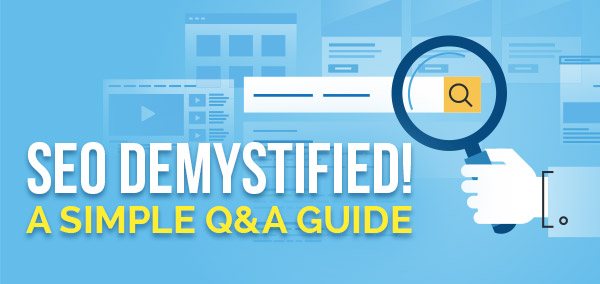SEO Demystified! A Simple Q&A Guide

What is SEO and SEO Ranking?
SEO, or Search Engine Optimization, is about publishing information on the internet in a search engine friendly way, so that it ranks high in search engine results pages.
In other words, when someone is searching for information about a product or service on Google, Bing, etc., websites of that product or service that has been well-optimized for search engines and has high SEO ranking will be among the top results.
What are SEO ranking practices, in the broad sense?
Well, in the broad sense, all the SEO ranking practices you can do to bump up your website as high as possible on the search engine results pages can be split into two: on-page SEO and off-page SEO.
On-page SEO ranking practices entail all sorts of tweaks done to your website and its content itself to make it rank higher.
Off-page SEO involves techniques such as link building, social media marketing, and so on.
What are Organic Results?
In search engine terminology, the results that come up naturally on the search results pages are referred to as organic results. These results show up on Google searches simply because they have been optimized with unique, non-plagiarised content that is rich in keywords.
Certain results come up because website owners pay for them to be there, and these do not count towards organic results. These paid search results and pay per click (PPC) ads are also a huge and integral part of search engine optimization and marketing in their own right.
What are On-Page SEO basics?
There are several on-page SEO ranking measures you could take to ensure that your site ranks high in search results. Descriptive page headings that are one of a kind, and unique content that are written in a style that appeal to humans (that is to say, it should not read machine-like and monotonous) go a long way in boosting rankings.
Preferably, each page should attempt to rank for a specific keyword or phrase, and a few related keywords should be thrown into the mix as well. The usage of tailor-made meta description tags and back-links to different sections of your website will help immensely as well.
Are there SEO ranking practices I should avoid?
Yes, indeed. There are several examples of websites which rank poorly simply because people, out of ignorance, take steps that end up harming their site ranking rather than helping it.
For instance, do not stuff your pages with keywords. If an excessive number of keywords ruin the readability of your page, it will not rank high in the search results pages.
A huge number of intrusive ads or ads that take up a large amount of space on the screen, full screen prompts to download your site’s mobile app, and random hyperlinks, all work towards yanking your page down in terms of rankings. These black hat practices can cause Google to clamp down on your website with a massive penalty.
Need more info on SEO ranking practices? We can help. Click Here!

